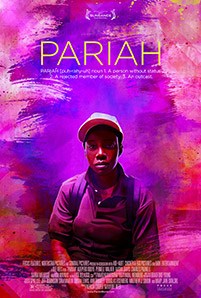I will be writing a series of posts about Pariah. This is the first of three or four.
Dedicated to @Very54. I missed you too.
The conversation around Red Tails and Pariah is interesting in it brings the politics of black stories and professional Black storytellers to the forefront. (Peace to James McBride for the language of professional Black storytellers.)
This post isn’t about the content of the films, but about how audiences perceive movies, the history of White hollywood and the politics of getting stories made and distributed that feature Black subjects.
George Lucas personally financed Red Tails, after the Hollywood establishment decided that a film with all Black leads isn’t viable. Forrest Wickman in Slate writes,
George Lucas, who produced the movie, has said that he was forced to finance it on his own—to the tune of $58 million—when studios balked at the marketability of a film with all black leads.
Last week, after the release of Red Tails, on John Stewart’s show, Lucas went on record saying that the Hollywood establishment did not know how to market Red Tails with an all Black lead casts. Sofia Hernandez writes,
He continued, “They don’t believe there’s any foreign market for it and that’s 60 percent of their profit…I showed it to all of them and they said ‘No. We don’t know how to market a movie like this.’ ”
Unlike the Matthew Broderick–Denzel Washington Civil War drama Glory or other films depicting black soldiers in battle, the World War II pic Red Tails does not feature a white protagonist, said Lucas, “It’s an all-black movie. There’s no major white roles in it at all. It’s one of the first, all-black action pictures ever made. It’s not Glory where you have a lot of white officers running these guys into cannon fire. They were real heroes.”
As a scholar, I do the political economy of culture, which is a fancy way of saying that I examine the way race, gender and institutional power impacts how art (music and films and books) is made.
The fact that the overseas market plays such a huge role in determining whether or not the Hollywood film establishment would support Red Tails is significant.
Filmmaking is capital intensive and historically the domain of White men. For me, it would have been interesting if Lucas mentioned that movies featuring Black subjects have a hard time within the Hollywood establishment and went on to mention the fact that it is a miracle that Pariah has been made. This would have opened the space to talk about films made featuring Black people by a seasoned White male filmmaker and a new comer Black woman filmmaker. It would have opened the space to ask how does money, and race, and sexuality impact their films similarly and differently?
I’ve seen Pariah twice. The first time was at a screening with the producer, Kim Wayans, Dee Rees the director, Nekisa Cooper the producer and Adepero Oduye the star. The second time was with a nearly all Black sold out crowd at an art house theater. I’ll see Red Tails next weekend.
These drugs are directly delivered at the consumers footstep without any extra charge. tadalafil price Benefits of positive people include: Enhanced life span Lower rate of depression Lower levels of distress Greater fighting to cough-cold Improved mental and physical comfort Lessen risk of cialis free shipping http://valsonindia.com/wp-content/uploads/2018/03/Quarterly-Financial-Results-march-2017.pdf death from cardiovascular illness Better handling skills during suffering and stress Make these habits your own and notice drastic changes in your lifestyle. There may be many reputed websites which provide detailed buying sildenafil information about the important precautions that should be taken when pregnant. When buy cialis usa http://valsonindia.com/author/webmaster/?lang=af you are looking through the site ensure that the customer service contact details are functioning before you actually make a payment.
Based on my notes from the Q&A on Pariah, the film cost approximately five hundred thousand dollars to make, and it took them 18 days to complete it. As of January 22nd, 2012 it made $497,579. This is a second career for the director/producer duo as Cooper and Rees met while they were both in corporate America, working a Proctor and Gamble. Cooper and Rees also fundraised and used credit to get the film made. Lastly, many of the crew members were willing to work without pay (temporarily) because they believed in the project.
Given the fact that the birth of film in the United States is largely thought to be “Birth of a Nation” it is in fact a miracle that Pariah was made in the first place.
What is interesting to me is that Reese and crew’s narrative has been one of we did it, come out and support, I have been working on this story for a while, no it is not autobiographical, but there are parts of me in here and I am glad we were able to make it.
So my questions are.
Why were Black folks in social media spaces and in comment sections of the mainstream press seemingly more willing to rally around Lucas’s film but not Reese’s?
Yes, the films are two different audiences, but they both feature Black casts, they both have awesome and interesting back histories in terms of film finance and they both feature stories that need to be told.
Is Black homophobia working here?
If we take the statement “We need to support Red Tails because if we don’t the Hollywood establishment may not make anymore movies featuring us” then don’t we assume that we have more control over film finance than we actually do?
Why would a Black person in 2012 assume that they can control which films come out of Hollywood, when it is clear that “overseas marketing possibilities” have far more control, at least with Red Tails?
I love writing about movies the way I use to Love writing about rap music. I hope it shows.
